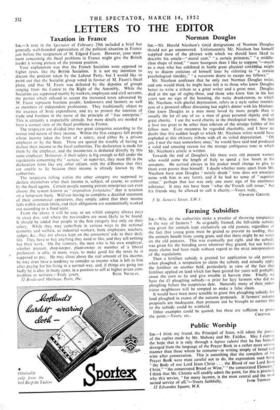Norman Douglas
S1R,—Mr. Harold Nicolson's timid denigrations of Norman Douglas should not go unanswered. Unfortunately Mr. Nicolson has himself supplied most of the phrases with which we should have liked to describe his article--" moral cant," " a certain primness," " a middle- class shape of mind," more bourgeois than I like .to suppose "—much as a man who has exhibited in battle great physical coall'clice might try to disarm criticism of himself later by referring to. " a certain psychological timidity," " a recurrent desire to escape my fellows."
Mr. Nicolson confesses that he only met Norman Douglas twice, and one would think he might have left it to'those who knew Douglas better to write a tribute to a great writer and a 'great man. Douglas
• died at the age of eighty-three, and those who knew him in his last years saw no sign of the boasting, the noisy drunkenness, to which Mr. Nicolson, with gleeful deprecation, refers in a style rather reminis- cent of aprotocol officer discussing last night's dinner with his Minister. One knew Douglas as a man more loved by more people than is usually the lot of any of us: a man of great personal dignity and of great charity. I use the word charity in the theological sense. He had a love too great to be other than tolerant of the strange foibles of his fellow men. Even meanness he regarded charitably, and I have no doubt that this sudden laugh to which Mr. Nicolson refers would have exploded at this obituary tribute with all its veiled depreciation. " Oh yes, I met the man somewhere once," he would have said and produced a valid and amusing reason for the strange ambiguous tone in which Mr. Nicolson's article is written.
Towards the end of Douglas's life there were old peasant women who would come the length of Italy to spend a few hours in his company. He carried always in his pocket small change to give to those even poorer than himself. I doubt whether many apart from Mr. Nicolson have seen Douglas " noisily drunk " (one does not associate noise with him in any form), and if he had no sense of " superior virtue," perhaps that too was only one more sign of his enormous tolerance. It may not have been " what the' French call tense," but his friends may be allowed. to call it charity.—Yours truly, 5 St. James's Street, S.W.!.
GRAHAM GREENE.










































 Previous page
Previous page